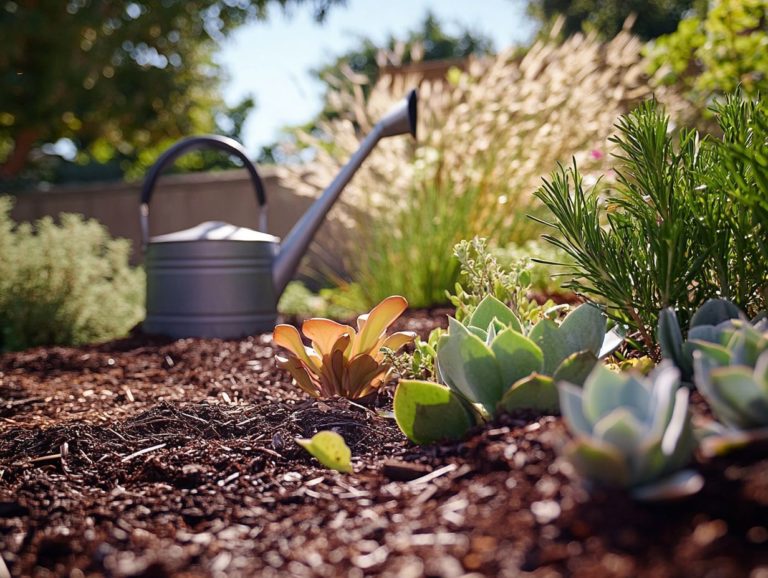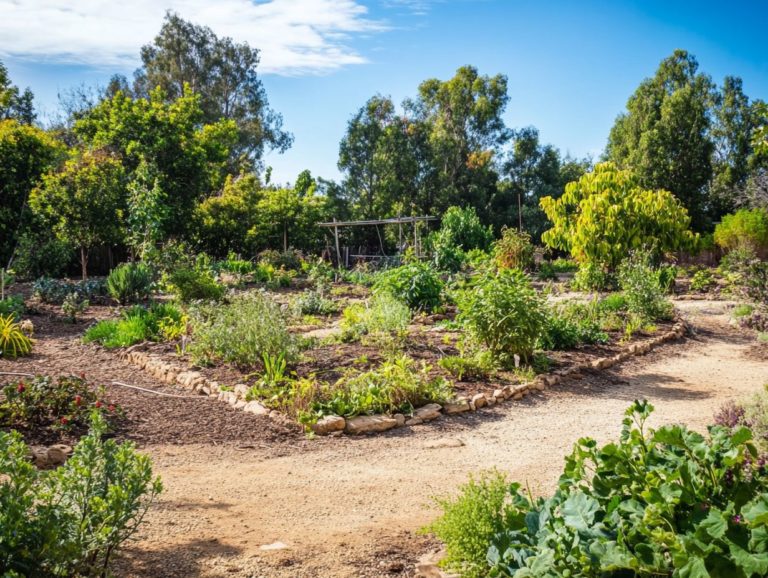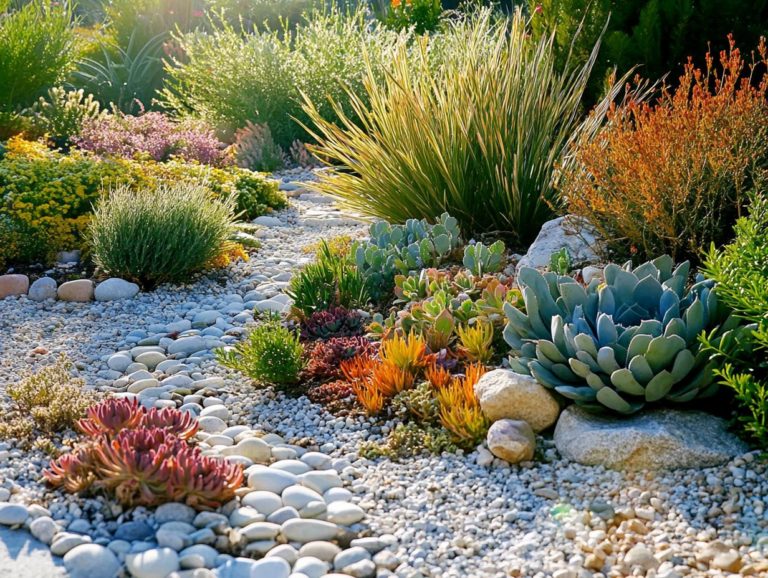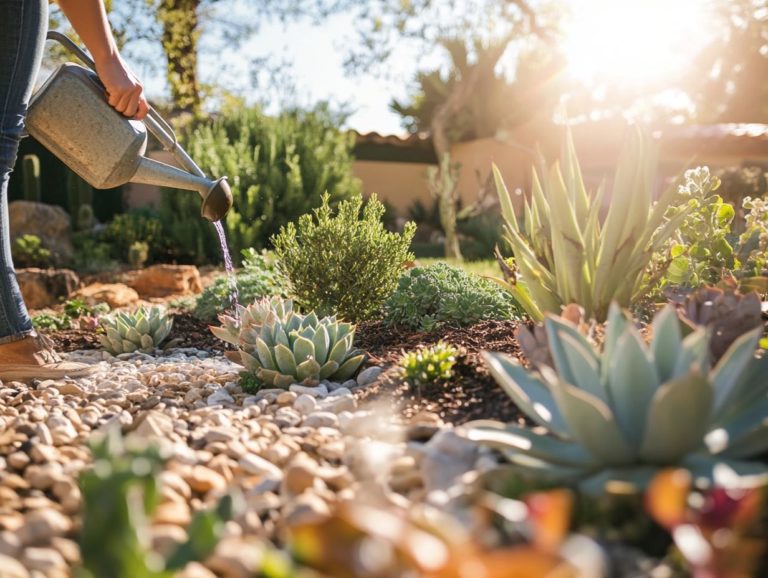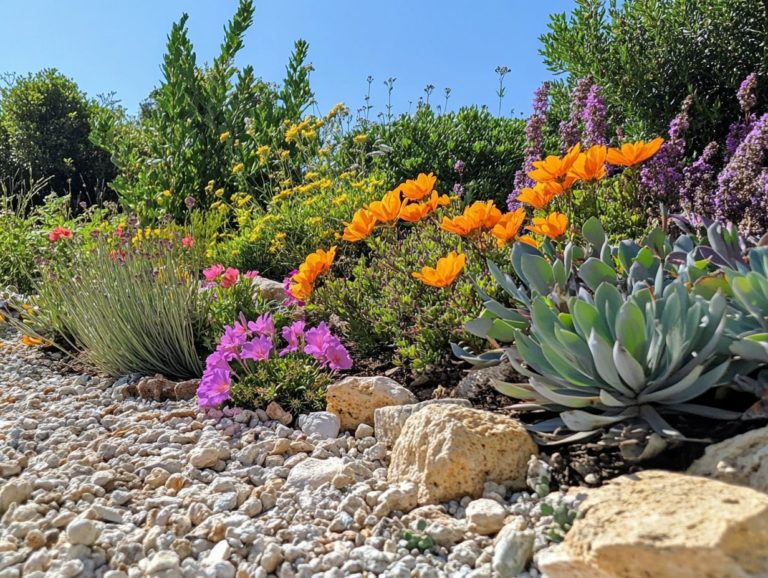The Benefits of Drought Gardening for Seniors
Drought gardening presents a remarkable opportunity for you to embrace the therapeutic joys of gardening while navigating the challenges posed by climate change.
This approach not only conserves precious water but also encourages physical activity and enhances mental well-being. Of course, it does come with its own set of challenges, particularly for those who may face physical limitations.
You can explore the many benefits of drought gardening for seniors, along with practical tips for initiating and maintaining your own drought garden. You ll also find strategies to tackle common obstacles with confidence.
Whether you’re a seasoned gardener or just taking your first steps, discover how you can cultivate a flourishing garden that thrives on less water and enjoy the rich rewards it brings.
Contents
- Key Takeaways:
- Benefits of Drought Gardening for Seniors
- Challenges and Considerations for Senior Drought Gardeners
- How to Start a Drought Garden as a Senior
- Tips for Maintaining a Successful Drought Garden
- Frequently Asked Questions
- Unlocking the Secrets of Drought Gardening for Seniors!
- What are the physical benefits of drought gardening for seniors?
- How can drought gardening benefit seniors’ mental health?
- What are some benefits of growing a variety of plants in a drought garden?
- How can drought gardening be financially beneficial for seniors?
- What are some tips for seniors who want to start drought gardening?
Key Takeaways:
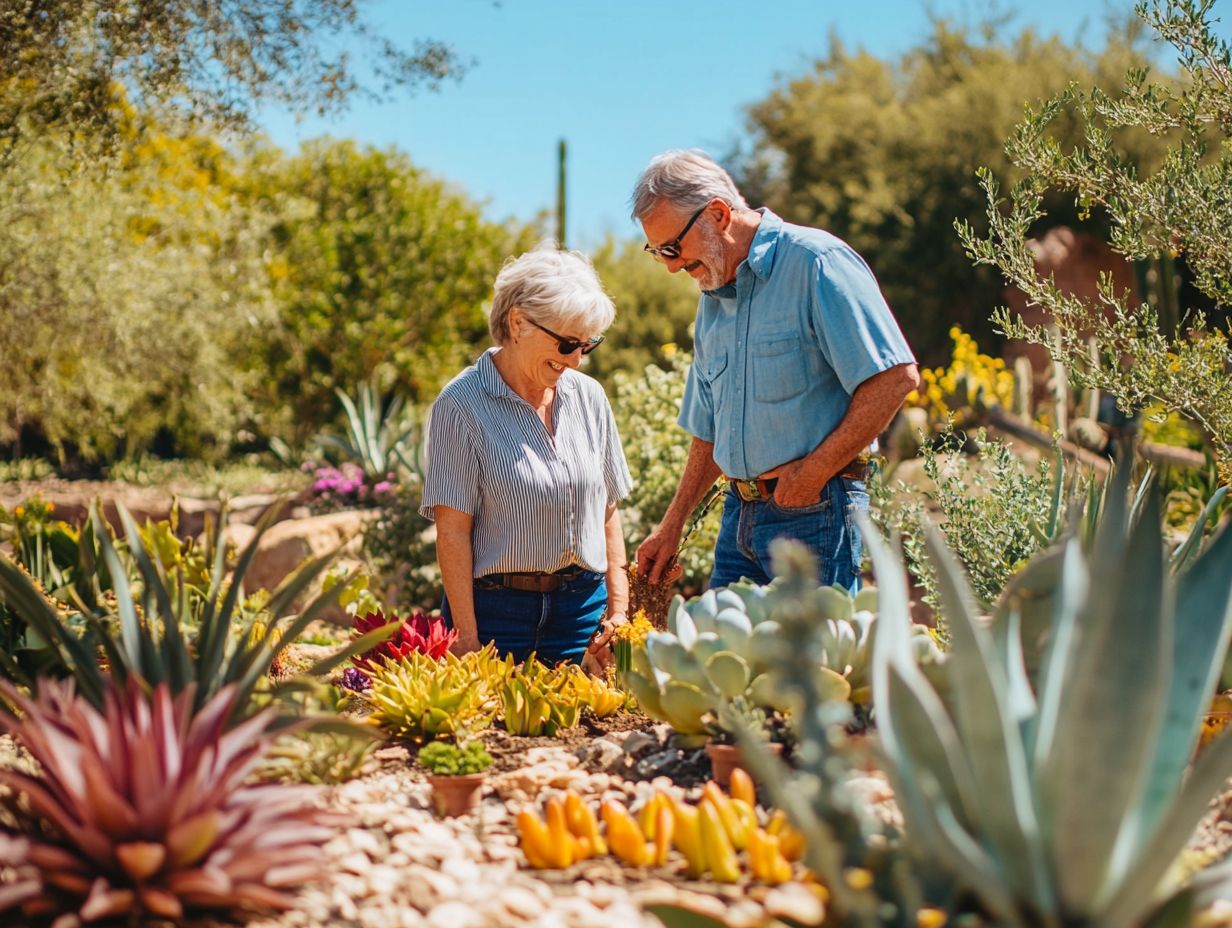
- Drought gardening can be rewarding for seniors, promoting health through gentle exercise and stress relief.
- Selecting the right plants and techniques helps seniors successfully start and maintain a drought garden.
- Implementing water conservation strategies and managing pests are key for maintaining a successful drought garden.
What is Drought Gardening?
Drought gardening is all about cultivating plants that thrive in dry conditions. It s a perfect choice if you’re seeking physical and mental health benefits.
This approach emphasizes low-maintenance plants that require minimal water. You can also promote sustainable gardening practices.
By diving into drought gardening, you reap the therapeutic rewards of connecting with nature, nurturing both your body and mind.
This gardening method invites you to engage in light physical activity that keeps you active and healthy! Techniques like xeriscaping, which refers to landscaping that reduces or eliminates the need for irrigation, and incorporating native plants not only help conserve water but also create stunning landscapes that require little upkeep.
Community gardens can significantly enhance this experience, offering a welcoming space where you can bond with others over shared gardening adventures while picking up valuable skills. Embracing these low-care plants isn’t merely about beautifying your surroundings; it s also a fantastic way to cultivate a sense of achievement and connection, ultimately enriching your emotional well-being.
Benefits of Drought Gardening for Seniors
Drought gardening offers exciting benefits that can transform your life! It encompasses everything from improved physical health to enhanced emotional well-being, and you can explore the long-term benefits of drought gardening, creating a holistic approach to elder care.
By engaging in this type of gardening, you not only promote physical activity but also open the door to socialization through community gardens and gardening clubs. This fosters a profound sense of connection and belonging, enriching your overall experience.
Physical and Mental Health Benefits
The physical and mental health benefits of drought gardening are truly remarkable. This activity not only encourages gentle exercise but also increases your exposure to sunlight, which is essential for absorbing vitamin D.
By engaging in this form of gardening, you ll boost your physical fitness and find your anxiety levels decreasing as your mental clarity improves.
As you participate in drought gardening, you’ll cultivate better coordination and balance skills that can often decline with age. The rhythmic motions of planting, pruning, and weeding provide a gentle workout, supporting your cardiovascular health and promoting better circulation and stamina.
On a psychological level, tending to plants offers a calming escape from daily stressors, allowing you to practice mindfulness as you immerse yourself in the moment. The nurturing aspect of gardening nurtures your emotional wellness, too, as you discover joy and a sense of purpose in caring for living things. This contributes to an overall enhanced quality of life, enriching your daily experience.
Challenges and Considerations for Senior Drought Gardeners
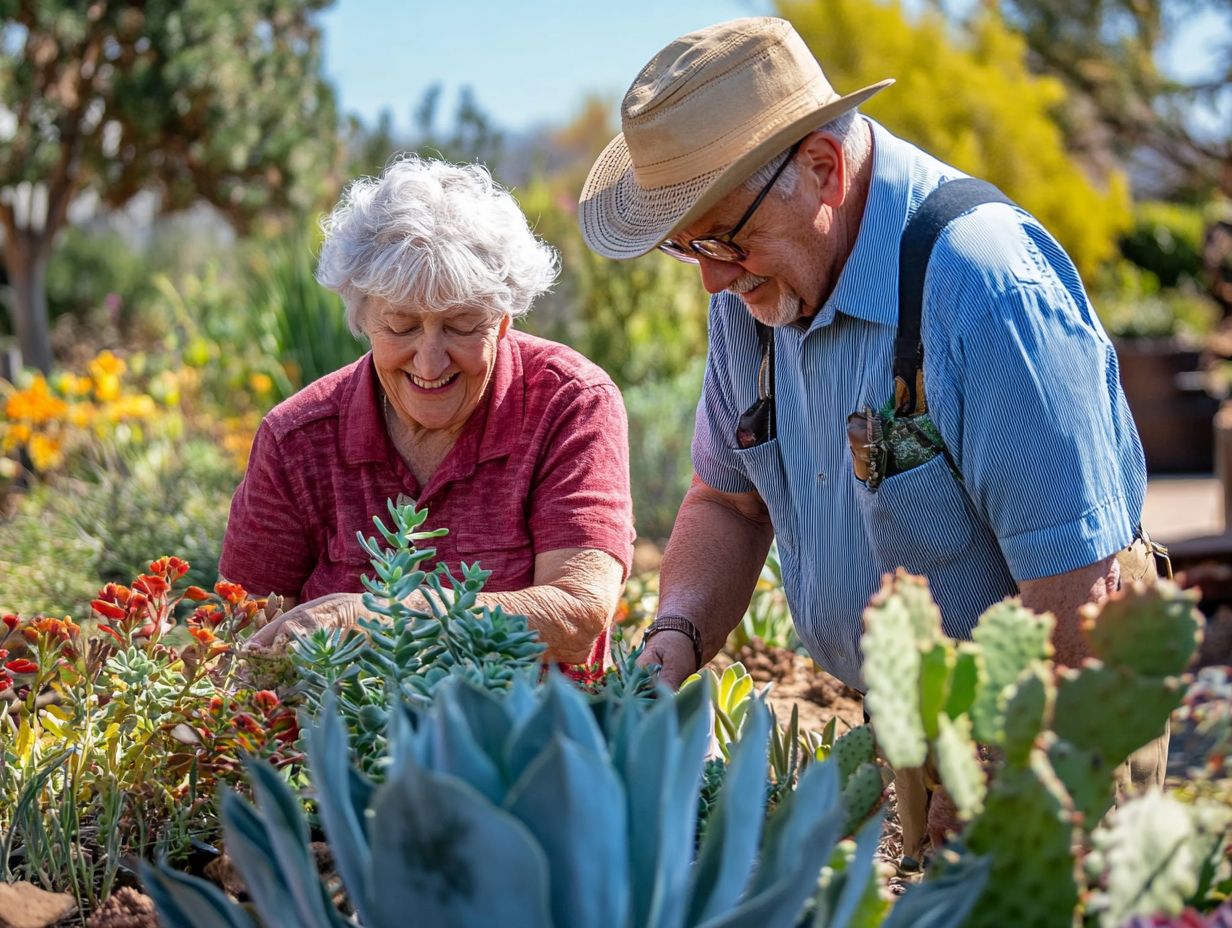
Drought gardening offers many advantages, but it also comes with challenges to consider for a successful gardening experience. It’s essential to address any physical limitations you may face, ensuring that your gardening space is accessible.
Using tools designed to be easier to use can transform the gardening process into a more enjoyable and less strenuous activity. This allows you to fully appreciate the rewards of your efforts.
Addressing Physical Limitations
Addressing physical limitations is essential for seniors who wish to explore drought gardening, as it enables gentle exercise without the risk of overexertion. Additionally, understanding the cost savings of drought-resistant gardening can further enhance their gardening experience.
By opting for ergonomic gardening tools, raised beds, and accessible planting techniques, you can immerse yourself in the gardening experience while minimizing strain on your body.
Incorporating low-maintenance plants is another key strategy. These varieties not only demand less physical effort but also flourish in dry conditions, making them ideal for crafting beautiful landscapes with ease.
Engaging in gentle exercises, such as stretching and light gardening activities, enhances your flexibility and promotes overall well-being. This helps you remain active and socially connected.
Design pathways that accommodate mobility aids or use gardening benches to alleviate the strain of bending. By embracing these accessible gardening strategies, you can nurture your green thumb while taking care of your physical health.
Choosing Appropriate Plants and Techniques
Choosing the right plants and techniques is essential for seniors practicing drought gardening. This approach enables you to cultivate low-maintenance plants that thrive in arid conditions while still providing quality produce. Exploring the environmental benefits of drought gardening can further enhance your gardening experience.
By selecting the right varieties, you simplify the gardening process and elevate your overall gardening experience.
Incorporating drought-resistant plants ensures you have a steady supply of fresh produce, significantly supporting healthy eating habits.
These specially selected varieties often require less water, making it easier for you to manage your garden with fewer resources.
Employing techniques like mulching and drip irrigation can enhance water retention. This creates optimal conditions for nutrient absorption. Understanding the importance of soil health is crucial in maintaining a sustainable garden, allowing your plants to thrive and yield bountiful harvests.
By adopting these gardening practices, you not only enjoy the pleasures of gardening but also make a positive contribution to environmental sustainability.
How to Start a Drought Garden as a Senior
Starting a drought garden as a senior is an incredibly rewarding adventure waiting for you! Filled with countless gardening tips and strategies, it ensures your success.
By crafting a clear plan, choosing the right plants, and actively engaging with your community, you can cultivate a healthy and vibrant garden that significantly enhances your emotional well-being.
So, take the first step and start your drought gardening journey today!
Steps to Building and Maintaining a Drought Garden
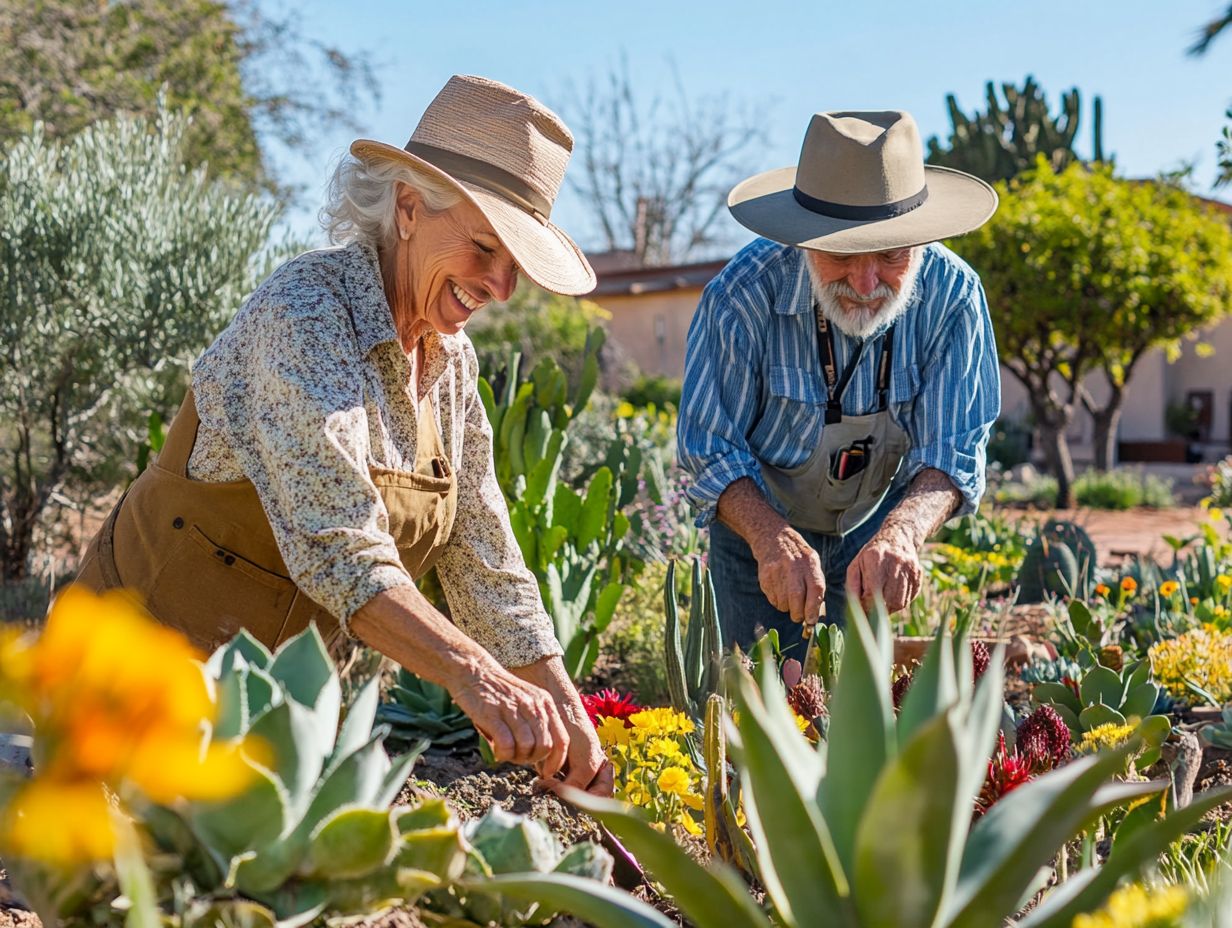
Building and maintaining a drought garden is rewarding. Focus on soil preparation, plant selection, and ongoing care to create a sustainable garden.
- Enrich your soil with organic matter. This boosts drainage and retains moisture for drought-resistant plants.
- Select native and drought-tolerant plants to reduce water needs while adding vibrant flowers or delicious produce to your garden.
- Use efficient watering techniques like drip irrigation or soaker hoses to minimize waste and deliver moisture directly to plant roots.
- Regularly check for weeds and pests to keep your plants healthy and enhance your gardening experience.
- Engage in composting practices to enrich your soil and promote environmental stewardship, making your gardening more fulfilling.
Tips for Maintaining a Successful Drought Garden
Adopt specific tips and strategies to effectively manage your gardening space while promoting sustainability. Utilizing water conservation techniques and pest control measures will help cultivate a flourishing garden that enhances your overall well-being.
Water Conservation Strategies
Water conservation is crucial in drought gardening, especially for seniors aiming to sustain their gardens with minimal water. Techniques like drip irrigation, mulching, and choosing drought-tolerant plants enhance water efficiency.
Using rain barrels effectively collects rainwater. This method harnesses nature’s resources for your garden.
Grouping plants with similar watering needs helps achieve efficient irrigation. Thoughtful garden layouts and appropriate techniques maintain beauty while conserving precious water resources.
Dealing with Pests and Diseases
Managing pests and diseases is essential for a healthy garden. Embrace organic pest control methods and preventive strategies to protect your plants and ensure lush growth.
In extreme weather conditions, creating a resilient garden is key. Techniques like integrated pest management help keep invasive species at bay. Methods like insecticidal soap or neem oil can combat common pests without harming beneficial insects.
Consider companion planting to fortify plants against pests. Regular inspections catch early signs of trouble for timely action.
Mulching keeps soil moist and deters weeds that harbor pests. By staying proactive, you can cultivate a thriving drought garden while minimizing risks.
Frequently Asked Questions

Unlocking the Secrets of Drought Gardening for Seniors!
Discover the joys of drought gardening! It s not just about saving water; it s about enriching your life!
Drought gardening is a practice of growing plants that require minimal water in areas with limited rainfall.
This method can benefit seniors by providing them with a low-maintenance and cost-effective way to garden.
What are the physical benefits of drought gardening for seniors?
Drought gardening can offer seniors a great form of low-impact exercise, helping to improve strength, flexibility, and coordination, while also providing economic benefits.
It can also help increase vitamin D levels through exposure to sunlight, leading to stronger bones and a healthier immune system.
How can drought gardening benefit seniors’ mental health?
Drought gardening can have a positive impact on seniors’ mental health by providing a peaceful and relaxing activity that can reduce stress, anxiety, and depression. Understanding the benefits of drought-resistant gardening can further enhance this experience.
Drought gardening can also help improve cognitive function and memory skills by engaging seniors in learning about different plants, including understanding the benefits of mulching in drought gardening.
What are some benefits of growing a variety of plants in a drought garden?
Growing a variety of plants in a drought garden can provide seniors with a diverse range of nutritious fruits, vegetables, and herbs, along with psychological benefits to enjoy.
This healthy eating not only boosts getting more nutrients but also attracts beneficial insects and pollinators, creating a thriving ecosystem in the garden.
How can drought gardening be financially beneficial for seniors?
Drought gardening can be financially beneficial for seniors as it requires less water usage, which can result in lower utility bills, along with health benefits of gardening with drought plants.
It also allows seniors to grow their own produce, providing quality produce and reducing the need to purchase expensive fruits and vegetables from the store.
What are some tips for seniors who want to start drought gardening?
Ready to start? Don t wait! Choose your plants and dig into this rewarding hobby today!
Seniors who want to start drought gardening should start small and choose low-maintenance plants that are suitable for their climate and level of maintenance.
It’s also important to properly prepare the soil and provide adequate mulching, which means covering the soil with materials like leaves or straw to help retain moisture.
Seeking advice from a gardening expert can also be helpful for beginners, especially those looking to connect with gardening clubs or local community gardens.

